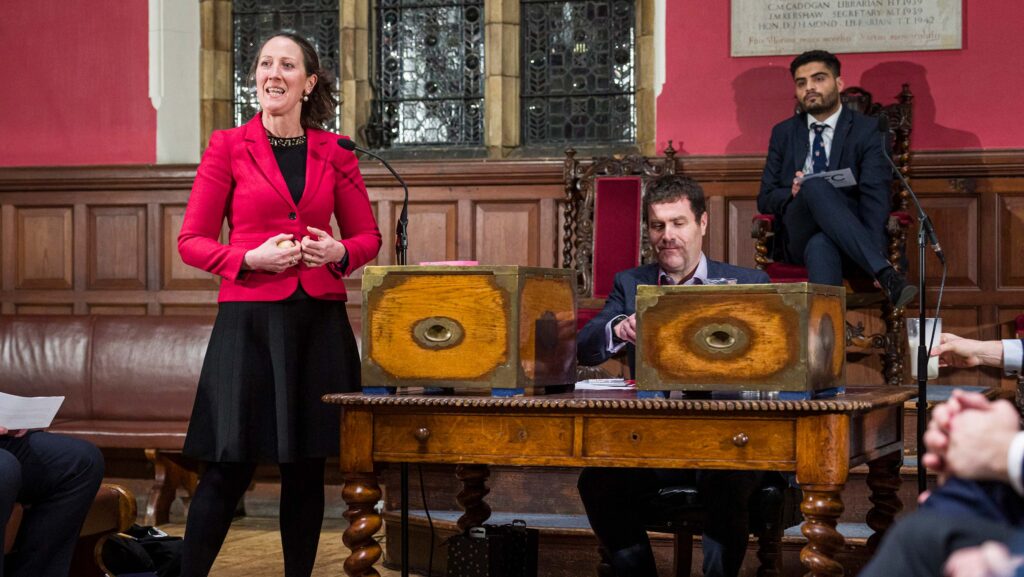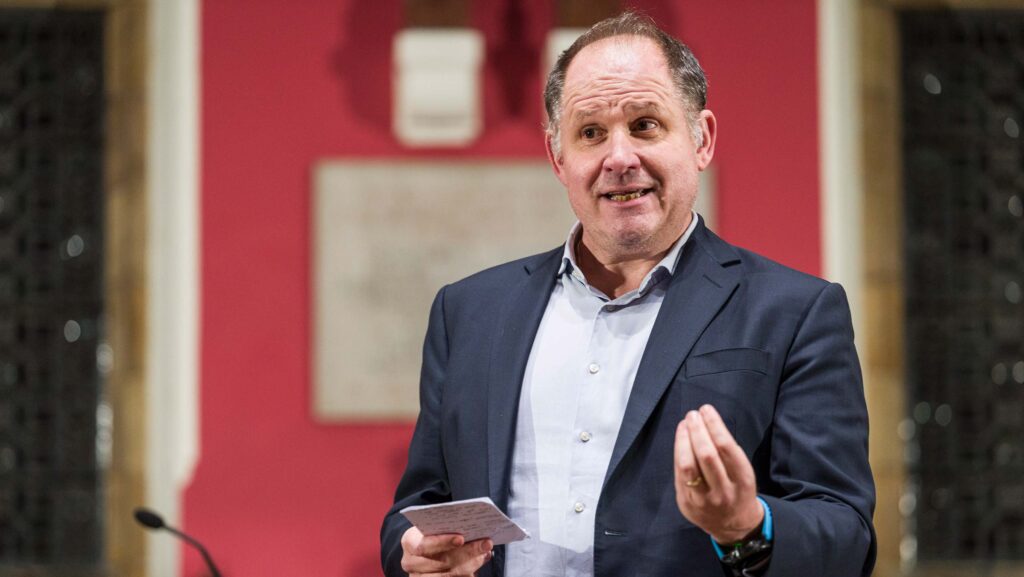OFC 2025: ‘UK needs more grazing livestock, not less’
 Jude Capper © OFC
Jude Capper © OFC Delegates attending the recent Oxford Farming Conference (OFC) have accepted the idea that UK agriculture needs more, not fewer, grazing livestock, to be truly sustainable – the subject of the traditional Oxford Union debate on Thursday evening (10 January).
The motion was put forward by Jude Capper, professor of sustainable beef and sheep at Harper Adams University, who presented her arguments with a strong focus on the role of dung beetles in agriculture.
See also: ‘Food production and nature recovery go hand in hand’
She warned that it would be “catastrophic” to reduce UK livestock numbers, framing cattle manure as a critical factor. “No livestock, no soil, no future,” she said.
To illustrate her point, Ms Capper held up a potato to the room full of delegates, explaining that it had been nourished by the manure from grazing livestock.
She highlighted that 93% of UK consumers have a positive image of the potato, going on to explain how livestock and crops work in tandem, with grazing animals playing a vital role in improving the soil microbiome.
“Whatever your dietary preferences, it’s crucial that we have meat, dairy, and vegetables available,” she said.
She emphasised the importance of dung beetles in maintaining soil structure, quality, and health, suggesting that they save UK farmers £367m annually by boosting crop yields, improving pasture quality, and promoting animal growth.
Ms Capper’s motion was supported by Rob Havard, ecologist and owner of Phepson Angus, who argued that converting arable land to grazing pastures could actually reduce the land’s carbon footprint.
Referring to his own farm, he explained that they had converted arable land back to grassland, resulting in the sequestration of 7t of carbon over the past 10 years.
An opposing argument
But Ms Capper’s views were challenged by Henry Dimbleby, co-founder of Bramble Partners, and Colin Ferguson, partner of P Ferguson and Co, and NFU Scotland Dairy vice-chairman.
Mr Dimbleby began by assuring delegates that, despite his forthcoming argument, “he loved meat,” supporting his claim with an anecdote about spit-roasting a sheep stuffed with beef testicles for his birthday.
He then shifted to the topic of sustainability, emphasising the need for food security, the protection of the nation’s farming capabilities, and safeguarding the climate.
“It takes 90 billion animals a year to feed the global population,” he claimed. “These animals weigh 20 times as much as all of the wild nature and twice as much as humans.

Henry Dimbleby © OFC
“We simply do not have enough land in this country to restore nature to the level we need – we have enough meat.”
Mr Dimbleby claimed that the UK uses 85% of its farming land to grow food, with agriculture contributing 12% of the country’s carbon emissions.
He then referenced Defra’s projections, claiming that the carbon percentage from agriculture is expected to rise to about 50% by 2040.
Continuing the argument with a jovial address, Mr Ferguson took delegates on a hypothetical tour of his farm, arguing that we don’t need more livestock, as you can “have too much of a good thing”.
He described the “chaos” that cows can bring, saying “it’s not farming, it’s chaos management.”
Contributions
The debate saw a number of contributions from the floor, including one from Michael Lee, deputy vice-chancellor at Harper Adams University.
In support of the motion, he argued that the British Isles have always been, and will continue to be, predominantly grassland.
He emphasised that grazing animals are essential for maintaining this land use.
“We need the land that is going to deliver that grassland in a global climate change emergency, and that will be the British Isles,” he said.
Tom Allen-Stevens, an arable farmer from Oxfordshire, argued against the motion, stressing the importance of the health of soil-dwelling creatures.
He highlighted the need to consider and protect soil microbiome, facing boos from delegates as he encouraged them to consider gene editing and the Bovaer feed additive.
At the end of the debate, a close vote revealed that 193 delegates supported the motion that “UK agriculture needs more grazing livestock, rather than fewer, to be truly sustainable,” while 186 delegates rejected it.
